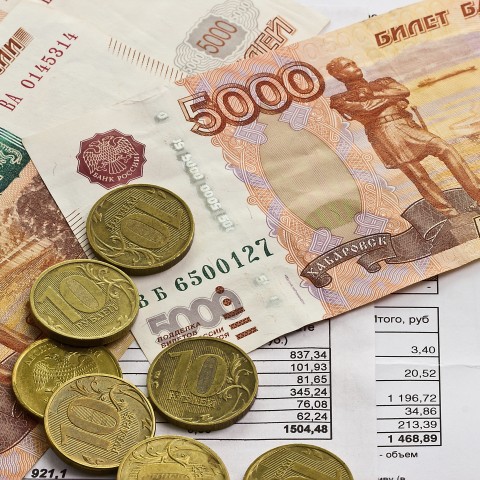
Have you already mastered the basics of the Russian language? If so, this means you have put in the time and effort to gain an extensive vocabulary and that you can make simple statements with relative ease. Congratulations!
But as they say, you can always do better. You should be proud of the Russian-language proficiency level that you have achieved up to this point, but remember that there is always room for improvement. To reach the advanced level, you’ll need to study more advanced Russian words and make continual progress by working to improve your skills on a daily basis.
Thanks to the global spread of the internet, it has become more convenient than ever to learn Russian online. If you would like to improve your Russian skills even further and learn to use the language exactly like native speakers, then you’re in the right place.
RussianPod101 has compiled this comprehensive list of advanced Russian vocabulary words you’ll need in order to level up. We have included words and example sentences that will definitely allow you to show off your knowledge: academic words, business terms, legal jargon, and alternative “high-end” words to use in place of their simpler counterparts.

Online learning definitely reduces financial strain as it’s far more affordable compared to attending traditional universities or language classes.
 Table of Contents
Table of Contents
- Advanced Academic Words
- Advanced Business Words
- Advanced Medical Words
- Advanced Legal Words
- Alternative Words for Academic or Professional Writing
- Conclusion
1. Advanced Academic Words
The education systems of the USA, Canada, Australia, and Europe differ significantly from the education system in Russia. In this section of our advanced Russian words list, you’ll find words and phrases in Russian that will be useful to know while studying in Russian schools and universities (and, of course, when speaking with students in Russia). The topic of education is very broad, but the purpose of this list is to provide you with the most relevant words for Russian communication in academic settings.
- Экзамен (Ekzamen) – “Assessment” [noun]
- Сомнительный (Somnitel’nyy) – “Ambiguous” / “Doubtful” [adjective]
- Дискуссия (Diskussiya) – “Discussion” [noun]
- Сессия (Sessiya) – “Examinations” [noun]
- Диплом (Diplom) – “Diploma” [noun]
Example Sentences:
Сомнительно, что она сдаст экзамен.
Somnitel’no, chto ona sdast ekzamen.
“It is doubtful that she will pass the exam.”
После показа фильмов проводилась тематическая дискуссия.
Posle pokaza fil’mov provodilas’ tematicheskaya diskussiya.
“Each showing of the documentary was followed by a panel discussion.”
После удачной сдачи сессии он получил диплом.
Posle udachnoy sdachi sessii on poluchil diplom.
“After successfully passing the examinations, he received a diploma.”

Over four million students were enrolled in Russian institutions of higher education in 2019.
- Лекция (Lektsiya) – “Lecture” [noun]
- Урок (Urok) – “Lesson” [noun]
На лекциях и уроках получают знания.
Na lektsiyakh i urokakh poluchayut znaniya.
“We gain knowledge at lectures and lessons.”
- Химический (Khimicheskiy) – “Chemical” [adjective]
- Принципы (Printsipy) – “Foundations” / “Basis” [noun]
Принципы химических реакций
Printsipy khimicheskikh reaktsiy
“Foundations of chemical reactions”
- Методическое пособие (Metodicheskoye posobiye) – “Guideline” [the word пособие is a noun and методическое is an adjective]
- Обнаружить (Obnaruzhit’) – “To detect” [verb]
- Случайно (Sluchayno) – “Randomly” / “Accidentally” [adverb]
- Приложение (Prilozheniye) – “Appendix” [noun]
Он случайно обнаружил приложение к методическому пособию.
On sluchayno obnaruzhil prilozheniye k metodicheskomu posobiyu.
“He accidentally discovered an appendix to the guideline.”
- Таблица (Tablitsa) – “Chart” / “Table” [noun]
Таблица является полезным инструментом.
Tablitsa yavlyayetsya poleznym instrumentom.
“The chart is a useful tool.”
- Кругозор (Krugozor) – “Prospect” / “Horizons” [noun]
У него широкий кругозор.
U nego shirokiy krugozor.
“He has broad horizons.”
- Абзац (Abzats) – “Paragraph” [noun]
Абзац форматируется как заголовок.
Abzats formatiruyetsya kak zagolovok.
“A paragraph is formatted as a heading.”
- Решающий (Reshayushchiy) – “Crucial” [adjective]
- Ядерный (Yаdernyy) – “Nuclear” [adjective]
Первым пунктом повестки дня должна стать ратификация улучшений решающего инструмента обеспечения ядерной безопасности.
Pervym punktom povestki dnya dolzhna stat’ ratifikatsiya uluchsheniy reshayushchego instrumenta obespecheniya yadernoy bezopasnosti.
“At the top of the agenda should be the ratification of improvements to a crucial nuclear security instrument.”
- Расписание (Raspisaniye) – “Schedule” / “Timetable” [noun]
- Минимальный (Minimal’nyy) – “Minimum” [adjective]
Студенты получили ориентировочное расписание с минимальным количеством занятий.
Studenty poluchili oriyentirovochnoye raspisaniye s minimal’nym kolichestvom zanyatiy.
“Students received an indicative timetable with a minimum number of classes.”
- Ориентировочный (Oriyentirovochnyy) – “Preliminary” / “Approximate” [adjective]
- Общежитие (Obshchezhitiye) – “Dormitory” [noun]
В общежитии был беспорядок.
V obshchezhitii byl besporyadok.
“The dormitory was a mess.”
- Формат (Format) – “Format” [noun]
Сдайте работу в формате pdf.
Sdayte rabotu v formate pdf.
“Submit your work in PDF format.”
- Среда (Sreda) – “Medium” [noun]
Питательная среда содержит лактопептон.
Pitatel’naya sreda soderzhit laktopepton.
“The nutrition medium contains lactopeptine.”
- Продолжительность (Prodolzhitel’nost’) – “Duration” [noun]
Продолжительность занятия — 30 минут.
Prodolzhitel’nost’ zanyatiya — 30 minut.
“The duration of the lesson is 30 minutes.”
- Убеждённый (Ubezhdyonnyy) – “Convinced” [adjective]
Убеждённый европеец, он рассматривал европейский идеал строго в рамках международного сотрудничества.
Ubezhdyonnyy yevropeyets, on rassmatrival yevropeyskiy ideal strogo v ramkakh mezhdunarodnogo sotrudnichestva.
“A convinced European, he set the European ideal squarely in a framework of international cooperation.”
2. Advanced Business Words
Business vocabulary is not limited to business contexts; many of the advanced Russian words presented below are used in ordinary everyday conversations as well. While going through this list, keep in mind that each specialty requires a specific vocabulary set. Daily meetings with colleagues, negotiations with business partners, communication by phone and email—all these things require a special skill set and a specific set of vocabulary.
- Стратегия (Strategiya) – “Strategy” [noun]
- Встречное предложение (Vstrechnoye predlozheniye) – “Counteroffer” [noun]
Встречное предложение партнёра было частью запасной стратегии.
Vstrechnoye predlozheniye partnyora bylo chast’yu zapasnoy strategii.
“The partner’s counteroffer was part of a fallback strategy.”
- Фискальный (Fiskal’nyy) – “Fiscal” [adjective]
Бухгалтерский и налоговый учёт фискального накопителя
Bukhgalterskiy i nalogovyy uchyot fiskal’nogo nakopitelya
“Accounting and tax accounting of the fiscal driver”
- Сотрудничество (Sotrudnichestvo) – “Collaboration” / “Cooperation” [noun]
- Соглашение / Договор (Soglasheniye / Dogovor) – “Agreement” [noun]
Частью сотрудничества является подписание договора.
Chast’yu sotrudnichestva yavlyayetsya podpisaniye dogovora.
“Part of cooperation is the signing of an agreement.”
- Бюджет (Byudzhet) – “Budget” [noun]
Бюджет академии увеличился на 11 процентов.
Byudzhet akademii uvelichilsya na 11 protsentov.
“The budget for the academy was raised by 11 percent.”

Russia was the sixth-largest economy in the world in 2019, the World Bank estimates. In nominal terms, Russia ranks eleventh.
- Бухгалтер (Bukhgalter) – “Accountant” [noun]
- Отдел (Otdel) – “Department” [noun]
- Визитка (Vizitka) – “Business card” [noun]
На визитке бухгалтера был указан его отдел.
Na vizitke bukhgaltera byl ukazan yego otdel.
“The accountant’s business card indicated his department.”
- Валюта (Valyuta) – “Currency” [noun]
- Товар (Tovar) – “Commodity” [noun]
- Покупатель (Pokupatel’) – “Customer” [noun]
Покупатель купил товар за валюту.
Pokupatel’ kupil tovar za valyutu.
“The buyer bought the product with foreign currency.”
- Эффективность (Effektivnost’) – “Efficiency” [noun]
Отдел повысил показатели эффективности.
Otdel povysil pokazateli effektivnosti.
“The department has improved efficiency indicators.”
- Упаковочный лист (Upakovochnyy list) – “Packing list” [the word лист is a noun and упаковочный is an adjective]
- Срок (Srok) – “Deadline” / “Time” [noun]
- Счёт (Schyot) – “Invoice” [noun]
Срок поставки по счёту и упаковочному листу — сегодня.
Srok postavki po schyotu i upakovochnomu listu — segodnya.
“The invoice and packing list delivery time is today.”
- Инвестиции (Investitsii) – “Investment” [noun]
- Директор (Direktor) – “Managing director” [noun]
- Переговоры (Peregovory) – “Negotiation” [noun]
Директор провёл переговоры, касающиеся инвестиций.
Direktor provyol peregovory, kasayushchiyesya investitsiy.
“The managing director negotiated investments.”
- Вакансия (Vakansiya) – “Opening” / “Vacancy” [noun]
Вакансия руководителя этого проекта заполнена.
Vakansiya rukovoditelya etogo proekta zapolnena.
“The leadership vacancy on this project has been filled.”
- Прибыльный (Pribyl’nyy) – “Profitable” [adjective]
- Заказ (Zakaz) – “Purchase order” [noun]
Компания выполнила прибыльный заказ.
Kompaniya vypolnila pribyl’nyy zakaz.
“The company has completed a profitable order.”
- Резюме (Rezyume) – “Resumé” / “Curriculum vitae” [noun]
Я отправила моё резюме на вакантные места.
Ya otpravila moyo rezyume na vakantnyye mesta.
“I sent my resumé for a few job openings.”
- Подпись (Podpis’) – “Signature” [noun]
Подпись не нужна, только инициалы.
Podpis’ ne nuzhna, tol’ko initsialy.
“You don’t have to sign it; just your initials.”
- Поставка (Postavka) – “Supply” [noun]
- Налог (Nalog) – “Tax” [noun]
Поставка не облагается налогом.
Postavka ne oblagayetsya nalogom.
“The supply is tax-deductible.”
- Сделка (Sdelka) – “Transaction” / “Deal” [noun]
Сделка была прибыльной.
Sdelka byla pribyl’noy.
“The deal was profitable.”
3. Advanced Medical Words
Imagine that you’re in Russia when you start to feel unwell. To get the help you need, you’ll have to describe your symptoms and overall condition (knowing a little about the Russian health system would help, too). In this section, we’ll introduce you to the most useful advanced Russian words related to healthcare.
- Биопсия (Biopsiya) – “Biopsy” [noun]
Эндометриальная биопсия нужна, чтобы проверить эффективность прививки.
Endometrial’naya biopsiya nuzhna, chtoby proverit’ effektivnost’ privivki.
“An endometrial biopsy is needed to test the vaccine efficacy.”
- Деменция (Dementsiya) – “Dementia” [noun]
Совет фонда считает, что у меня деменция.
Sovet fonda schitayet, chto u menya dementsiya.
“The foundation board thinks I have dementia.”
- Ординатура (Ordinatura) – “Residency” [noun]
Мне так сильно понравилась ординатура, что я прошёл её дважды.
Mne tak sil’no ponravilas’ ordinatura, chto ya proshyol yeyo dvazhdy.
“I liked residency so much that I did it twice.”
- Заболевание (Zabolevaniye) – “Disease” / “Illness” [noun]
Заболевание является серьёзным тормозом для развития.
Zabolevanie yavlyayetsya ser’yoznym tormozom dlya razvitiya.
“The disease is a major problem for development.”
- Рецепт (Retsept) – “Prescription” [noun]
Врач выписал мне рецепт.
Vrach vypisal mne retsept.
“The doctor wrote me a prescription.”

Health is one of the crucial things in life that money can’t buy. Please, stay healthy!
- Астма (Astma) – “Asthma” [noun]
Ну, у её дочери астма.
Nu, u yeyo docheri astma.
“Well, her daughter has asthma.”
- Зависимость (Zavisimost’) – “Addiction” [noun]
Ричардс лечился от алкогольной зависимости в 2006 году.
Richards lechilsya ot alkogol’noy zavisimosti v 2006 godu.
“Richards was in rehab for alcohol addiction in 2006.”
- Поликлиника (Poliklinika) – “Outpatient department” [noun]
Поликлиника была создана для диагностики.
Poliklinika byla sozdana dlya diagnostiki.
“The outpatient department was set up to provide diagnostic care.”
- Медицинский центр (Meditsinskiy tsentr) – “Health care center” [the word центр is a noun and медицинский is an adjective]
- Cтоматологический (Stomatologicheskiy) – “Dental” [adjective]
Стоматологические клиники и медицинские центры в России могут быть частными.
Stomatologicheskiye kliniki i meditsinskiye tsentry v Rossii mogut byt’ chastnymi.
“Dental clinics and medical centers in Russia can be private.”
- Медицинский полис (Meditsinskiy polis) – “Health insurance certificate” [the word полис is a noun and медицинский is an adjective]
Медицинский полис будет только через месяц.
Meditsinskiy polis budet tol’ko cherez mesyats.
“The health insurance certificate will be ready in a month.”
- Приёмный покой (Priyomnyy pokoy) – “Emergency room” [the word покой is a noun and приёмный is an adjective]
- Больничная палата (Bol’nichnaya palata) – “Hospital ward” [the word палата is a noun and больничная is an adjective]
В приёмном покое много больничных палат.
V priyomnom pokoye mnogo bol’nichnykh palat.
“There are many hospital wards in the emergency room.”
- Операционная (Operatsionnaya) – “Operating room” [noun]
- Реанимация (Reanimatsiya) – “Intensive care unit” [noun]
- Пациент, больной (Patsiyent, bol’noy) – “Patient” [noun]
Из операционной пациента перевели в реанимацию.
Iz operatsionnoy patsiyenta pereveli v reanimatsiyu.
“The patient was transferred from the operating room to the intensive care unit.”
- Стационарный больной (Statsionarnyy bol’noy) – “Inpatient” [the word больной is a noun and стационарный is an adjective] Please note that the word больной can also be used as an adjective, just as “patient” can be a noun or an adjective in English.
- Амбулаторный больной (Ambulatornyy bol’noy) – “Outpatient” [the word больной is a noun and амбулаторный is an adjective]
- Медсестра (Medsestra) – “Nurse” [noun]
- Терапевт (Terapevt) – “Physician” [noun]
- Отоларинголог (Otolaringolog) – “ORT specialist” [noun]
Медицинское обслуживание стационарных и амбулаторных больных осуществляется разными группами докторов и медсестёр, в том числе терапевтами и отоларингологами.
Meditsinskoye obsluzhivaniye statsionarnykh i ambulatornykh bol’nykh osushchestvlyayetsya raznymi gruppami doktorov i medsestyor, v tom chisle terapevtami i otolaringologami.
“Medical services for inpatient and outpatient care are provided by various groups of doctors and nurses, including physicians and ORT specialists.”
- Записаться на приём (Zapisat’sya na priyom) – “To make an appointment” [verb]
Записаться на приём было очень сложно.
Zapisat’sya na priyom bylo ochen’ slozhno.
“It was very difficult to make an appointment with a doctor.”
According to statistics, more than half of Russians trust alternative and complementary medicine. Previously, only old ladies knew and shared amongst themselves all the recipes of alternative medicine; now, these recipes can be found on TV and the internet. Healing properties are attributed to herbal tinctures, the steam of boiled potatoes, and other methods of alternative medicine. Here are some advanced Russian words related to complementary medicine:
- Народная медицина (Narodnaya meditsina) – “Alternative medicine” / “Complementary medicine” [the word медицина is a noun and народная is an adjective]
- Грелка (Grelka) – “Hot water bottle” [noun]
- Горчичник (Gorchichnik) – “Mustard plaster” [noun]
- Отвар (Otvar) – “Brew” [noun]
- Целебные травы (Tselebnyye travy) – “Medicinal herbs” [the word травы is a noun (plural of трава – “herb”) and целебные is an adjective]
Отвар из целебных трав, горчичники и грелка являются популярными средствами в народной медицине.
Otvar iz tselebnykh trav, gorchichniki i grelka yavlyayutsya populyarnymi sredstvami v narodnoy meditsine.
“Medicinal herb brews, mustard plasters, and a hot water bottle are popular remedies in alternative medicine.”
4. Advanced Legal Words
While these legal words and phrases may be long, difficult to remember, and even harder to spell, they’re sure to prove useful in a number of contexts. Memorize these advanced Russian words to get a leg up in the business world and to enrich your personal life (these are words you might find used on news stations and in the paper).
- Гражданин (Grazhdanin) – “Passport holder” / “Resident” [noun]
- Закон (Zakon) – “Law” [noun]
- Нарушать закон (Narushat’ zakon) – “To break the law” [verb]
Граждане не должны нарушать закон.
Grazhdane ne dolzhny narushat’ zakon.
“Residents must not break the law.”
- Тяжба (Tyazhba) – “Lawsuit” [noun]
- Юрисконсульт (Yuriskonsul’t) – “Legal adviser” [noun]
- Законный представитель (Zakonnyy predstavitel’) – “Legal representative” [the word представитель is a noun and законный is an adjective]
Законный представитель и юрисконсульт помогут с судебными тяжбами.
Zakonnyy predstavitel’ i yuriskonsul’t pomogut s sudebnymi tyazhbami.
“A legal representative and a legal adviser will help with filing a lawsuit.”
- Нотариус (Notarius) – “Notary public” [noun]
Нотариус проверяет чистоту сделки и следит за тем, чтобы недвижимость продавалась свободной от долгов.
Notarius proveryayet chistotu sdelki i sledit za tem, chtoby nedvizhimost’ prodavalas’ svobodnoy ot dolgov.
“A notary public verifies the purity of a deal and ensures that property is sold free of debts.”
- Бездействие (Bezdeystviye) – “Omission” / “Nonfeasance” [noun]
Такие нарушения могут иметь место в силу действия или бездействия государства.
Takiye narusheniya mogut imet’ mesto v silu deystviya ili bezdeystviya gosudarstva.
“Such violations can occur by state action or omission.”
- Юрист (Yurist) – “Lawyer” [noun]
- Суд (Sud) – “Court” [noun]
- Спорить (Sporit’) – “To dispute” [verb]
Юрист оспорил это решение в суде.
Yurist osporil eto resheniye v sude.
“The lawyer disputed this decision in court.”

The Constitutional Court of the Russian Federation is the highest judicial body of constitutional supervision in the Russian Federation.
- Мошенничество (Moshennichestvo) – “Fraud” [noun]
- Прокурор (Prokuror) – “Prosecutor” [noun]
Прокурор предъявил обвинение в мошенничестве.
Prokuror pred’yavil obvineniye v moshennichestve.
“The prosecutor indicted for fraud.”
- Обжалование (Obzhalovaniye) – “Appeal” [noun]
- Виновный (Vinovnyy) – “Liable” / “Guilty” [adjective]
- Обвинительное заключение (Obvinitel’noye zaklyucheniye) – “Indictment” [the word заключение is a noun and обвинительное is an adjective]
Виновный обжаловал обвинительное заключение.
Vinovnyy obzhaloval obvinitel’noye zaklyucheniye.
“The person found guilty appealed against the indictment.”
- Судебное постановление (Sudebnoye postanovleniye) – “Injunction” [the word постановление is a noun and судебное is an adjective]
Это судебное постановление у нас в кармане.
Eto sudebnoye postanovleniye u nas v karmane.
“This injunction is in the bag.”
- Правосудие (Pravosudiye) – “Justice” / “Justice systems” [noun]
- Приговор (Prigovor) – “Verdict” / “Sentence” [noun]
В то же время женщины теряют доверие к системе правосудия, если приговоры минимальны и не обеспечивают им какую-либо защиту.
V to zhe vremya zhenshchiny teryayut doveriye k sisteme pravosudiya, yesli prigovory minimal’ny i ne obespechivayut im kakuyu-libo zashchitu.
“At the same time, women lose faith in justice systems where sentences are minimal and fail to offer them any protection.”
- Свидетель (Svidetel’) – “Witness” [noun]
Свидетель видел золотой рисунок.
Svidetel’ videl zolotoy risunok.
“The witness saw a gold stripe.”
- Правоотношение (Pravootnosheniye) – “Legal arrangement” / “Legal relation” [noun]
Ссылка на конкретное правоотношение может не вполне подходить для некоторых правовых систем.
Ssylka na konkretnoye pravootnosheniye mozhet ne vpolne podkhodit’ dlya nekotorykh pravovykh sistem.
“The reference to a defined legal relationship might not easily be accommodated in certain legal systems.”
- Права человека (Prava cheloveka) – “Human rights” [noun]
Права человека также являются основой внешней политики.
Prava cheloveka takzhe yavlyayutsya osnovoy vneshney politiki.
“Human rights also constitute one of the key pillars of foreign policy.”
5. Alternative Words for Academic or Professional Writing
To write a really good essay, you need to have a sufficient vocabulary of advanced Russian words. Developing the necessary language skills for writing a persuasive argument is crucial. In this section, we’ll equip you with the words and phrases you’ll need to write a great essay or to compose other forms of academic/professional writing. We have also included a number of advanced Russian words that are hard to pronounce, long, or hyphenated.
Alternative Words
In the first column, you’ll find a simple Russian word; in the second column, you’ll find a more advanced or nuanced replacement you could use instead.
| поэтому (poetomu) – “so” Conjunction | таким образом (takim obrazom) – “therefore” Conjunction |
| Таким образом, курс рубля повысился. Takim obrazom, kurs rublya povysilsya. “Therefore, the ruble has been appreciated.” | |
| большой (bol’shoy) – “big” Adjective | огромный (ogromnyy) – “huge” / “enormous” Adjective |
| Это огромный успех. Eto ogromnyy uspekh. “This is a huge success.” | |
| любить (lyubit’) – “to love” Verb | обожать (obozhat’) – “to adore” Verb |
| Я обожаю этот сериал. Ya obozhayu etot serial. “I adore this show.” | |
| хорошо (khorosho) – “good” Adjective | прекрасно / замечательно (prekrasno / zamechatel’no) – “beautiful” / “wonderful” Adjective |
| Это прекрасно, просто замечательно. Eto prekrasno, prosto zamechatel’no. “It’s wonderful, just beautiful.” | |
Complex Linking Words
- Для того чтобы (Dlya togo chtoby) – “For the purpose of” / “In order to”
This linking word can be used to introduce an explanation.
Example:
Нужно прийти домой пораньше, для того чтобы успеть сделать уроки.
Nuzhno priyti domoy poran’she, dlya togo chtoby uspet’ sdelat’ uroki.
“You need to come home early in order to have time to do your homework.”
- Другими словами / Иными словами (Drugimi slovami / Inymi slovami) – “In other words”
Use the linking word другими словами or иными словами when you want to express something more simply so that it’s easier to understand, or to emphasize or expand upon a point of view.
Example:
Иными словами, он переживает кризис.
Inymi slovami, on perezhivayet krizis.
“In other words, he is in a state of crisis.”
Complicated Words for Russian Learners
Are you up for a challenge? Then try memorizing a few of these more complicated Russian words for advanced learners!
- Подбираться, подкрадываться (Podbirat’sya, podkradyvat’sya) – “To sneak up” / “To creep up” [verb]
Он подобрался незаметно.
On podobralsya nezametno.
“He crept up unnoticed.”
- Растеряться (Rasteryat’sya) – “To become confused” [verb]
- Вдобавок (Vdobavok) – “In addition” [adverb]
Я растерялась и вдобавок забыла, что хотела сказать.
Ya rasteryalas’ i vdobavok zabyla, chto khotela skazat’.
“I was confused and, in addition, forgot what I wanted to say.”
- Неудовлетворённость (Neudovletvoryonnost’) – “Discontent” [noun]
Они вечно показывали неудовлетворённость работой.
Oni vechno pokazyvali neudovletvoryonnost’ rabotoy.
“They were forever discontent with work.”
- Правописание (Pravopisaniye) – “Spelling” [noun]
Одно ясно — его правописание оставляет желать лучшего.
Odno yasno — yego pravopisaniye ostavlyayet zhelat’ luchshego.
“One thing is certain—his spelling leaves much to be desired.”
- Самообладание (Samoobladaniye) – “Self-control” [noun]
Самообладание очень важно в любом обществе.
Samoobladaniye ochen’ vazhno v lyubom obshchestve.
“Self-control is crucial to any society.”
- Приспосабливаться (Prisposablivat’sya) – “To adapt” [verb]
Эти голограммы способны учиться и приспосабливаться.
Eti gologrammy sposobny uchit’sya i prisposablivat’sya.
“These holograms have the ability to learn and adapt.”
- Орудовать (Orudovat’) – “To work by tool” / “To wield” [verb]
Я даже не знаю, как орудовать ножом.
Ya dazhe ne znayu, kak orudovat’ nozhom.
“I wouldn’t even know how to wield a knife.”
- Махнуть рукой (Makhnut’ rukoy) – “To give up” / “A lost cause” [verb]
А ты, на тебя можно махнуть рукой.
A ty, na tebya mozhno makhnut’ rukoy.
“You, however—you’re a lost cause.”
- Истолковывать (Istolkovyvat’) – “To interpret” / “To translate” [verb]
- Ненадлежащий (Nenadlezhashchiy) – “Improper” [adjective]
Ненадлежащее поведение и поступки можно оценивать и истолковывать по-разному.
Nenadlezhashcheye povedeniye i postupki mozhno otsenivat’ i istolkovyvat’ po-raznomu.
“Improper behavior and conduct can be appraised and interpreted in different ways.”
- Несподручно (Nespodruchno) – “Awkwardly” / “Inconveniently” / “Uncomfortably” [colloquialism] [adverb]
В смысле… для меня это, как бы, несподручно.
V smysle… dlya menya eto, kak by, nespodruchno.
“I mean, I’m not comfortable with that.”
Hyphenated Words
In the Russian language, compound words are often hyphenated. These words include compound nouns, compound names, the names of compass points, shades of color, and so on. Here are some examples:
- Северо-восточный (Severo-vostochnyy) – “Northeast” [adjective]
Подул северо-восточный ветер.
Podul severo-vostochnyy veter.
“The northeast wind blew.”
- Фруктово-ягодный (Fruktovo-yagodnyy) – “With/made from fruits and berries” [adjective]
- Изумрудно-зелёный (Izumrudno-zelyonyy) – “Emerald-green” [adjective]
Это был фруктово-ягодный изумрудно-зелёный джем.
Eto byl fruktovo-yagodnyy izumrudno-zelyonyy dzhem.
“It was a fruit and berry emerald-green jam.”
- Диван-кровать (Divan-krovat’) – “Convertible sofa bed” [noun]
- Купля-продажа (Kuplya-prodazha) – “Buy/sell” / “Sale and purchase” [noun]
Фирма занималась куплей-продажей диванов-кроватей.
Firma zanimalas’ kupley-prodazhey divanov-krovatey.
“The company was engaged in the sale and purchase of sofa beds.”
- Мало-помалу (Malo-pomalu) – “Little by little” [adverb]
Мало-помалу каждая часть головоломки становится на своё место.
Malo-pomalu kazhdaya chast’ golovolomki stanovitsya na svoyo mesto.
“Little by little, every piece of the jigsaw is falling into place.”
- Перекати-поле (Perekati-pole) – “Rolling stone” [noun]
Потому что ты и я, мы — перекати-поле.
Potomu chto ty i ya, my — perekati-pole.
“Cause you and I, we’re rolling stones.”
6. Conclusion
In this article, you have learned more than 100 new advanced Russian words and phrases that will help you improve and enrich your Russian vocabulary.
RussianPod101.com has plenty of resources designed to help you reach your Russian learning goals, no matter your current proficiency level. If you’re feeling confident, we recommend creating your free lifetime account today and checking out our advanced Russian course.
In case you found this topic a bit difficult to grasp on your own, you can upgrade to Premium PLUS in order to use our MyTeacher service. A personal tutor will gladly help you memorize and use new Russian words and phrases, provide you with personalized assignments, and more!
Before you go: Which of the above words and phrases do you find most useful? Please, let us know in the comments.










